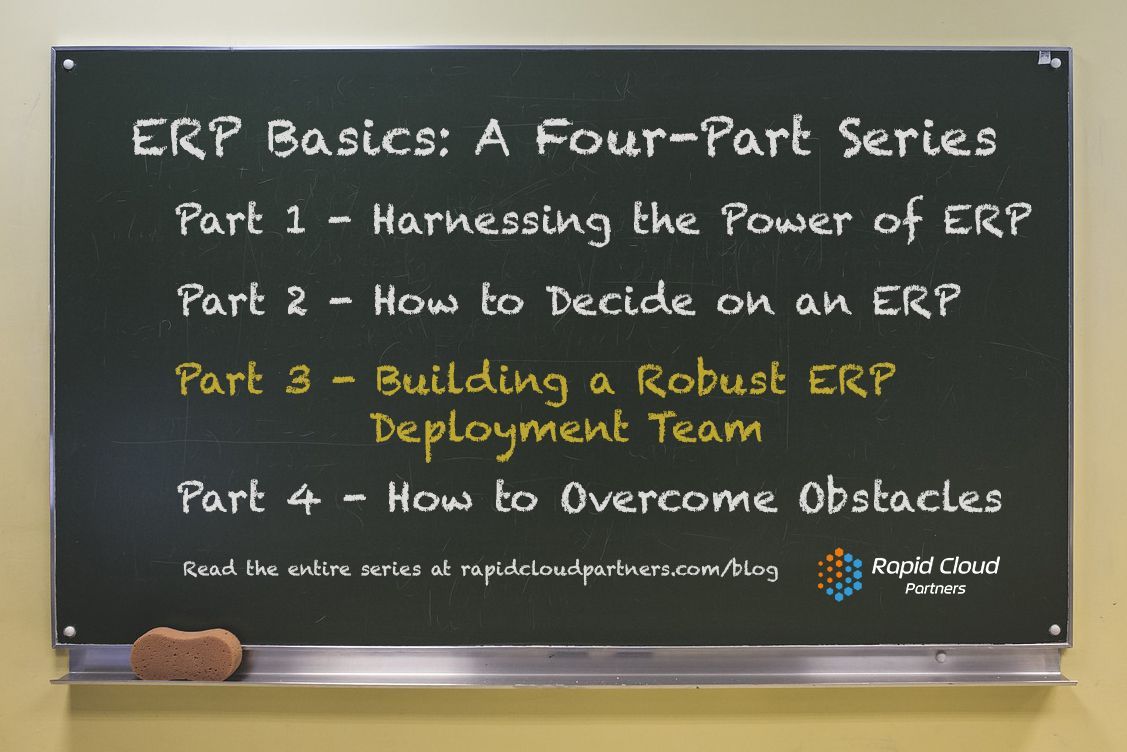In the strategic rollout of an Enterprise Resource Planning (ERP) system, selection and assignment of contributors is pivotal. Compiling a team with the required competencies from both internal resources and third party experts ensures the organization can effectively handle the complexities of the implementation.
Below are 10 tips to assemble a dynamic group that not only navigates these challenges with expertise, but also facilitates a seamless transition.
Identify Essential Stakeholders
Inclusion is critical. Ensure the ERP deployment team encompasses representatives from all departments impacted by the ERP implementation such as finance, IT, human resources, and operations. This cross-functional involvement guarantees diverse perspectives are considered, and the ERP solution addresses the needs of the entire organization.
Appoint an Executive Sponsor
Appoint a high-level executive who will provide leadership and empower decision-makers by bridging gaps, removing roadblocks, and ensuring stakeholders are aligned. As champion of the project, the sponsor will ensure alignment with overarching business goals and allow sustained momentum with corporate backing and strategic alignment.
Select a Competent Project Manager
Central to the team is the Project Manager (PM), tasked with the overall coordination of the deployment. The PM should have a broad understanding of the business, a background in successfully managing complex projects, and a firm grasp of the implementation lifecycle. Tasked with keeping the project on track, the PM must manage timelines, budgets and coordinate the myriad moving parts of the process.
Hire ERP Consultants
By leveraging external consultants who have proficiency in the chosen ERP system, the organization will gain invaluable insights and guidance. From tailoring the platform to the company’s requirements to offering customized solutions, professional expertise can guide the implementation process and reduce unnecessary complexity.
Recruit Technical and Functional Experts
Technical experts are paramount to the process and will be tasked with managing IT infrastructure while functional experts focus on configuring the software to enhance business processes. Mutual collaboration ensures the system is technically sound and aligned with business operations.
Incorporate Business Analysts
Business analysts (BA) bridge the gap between business needs and technical capabilities. The BAs gather detailed requirements from various business units to ensure the ERP system meets business needs while enhancing functionality and user satisfaction.
Engage Data Migration Specialists
Data integrity is non-negotiable for continuity of business operations. Specialists in data migration ensure that data from legacy systems is cleansed, mapped and transferred accurately to the new ERP system to support future processing and reporting needs.
Plan for Change Management
Change management specialists prepare the organization for transition to the new ERP. These team members address potential user concerns, manage expectations, evaluate change impact and foster a positive attitude towards the new system, all of which are essential for minimizing resistance and enhancing user adoption.
Dedicate Resources to Quality Assurance
Quality cannot be compromised. Quality assurance specialists should be tasked with rigorous testing to ensure the system is stable, efficient, and free of bugs before going live. This effort is vital to delivering a reliable system that meets all specified requirements from day one.
Establish Clear Communication and Training
Effective communication and comprehensive training are the foundation for a successful ERP launch. Taking a train-the-trainer approach, and empowering resident subject matter experts to serve as “super users” can provide a first line of defense for internal questions after go-live. These final steps ensure all team members are proficient users ready to maximize the benefits of the new tool.
By carefully selecting team members who fulfill these roles, and fostering a collaborative and well-informed environment, organizations can significantly enhance the likelihood of a successful ERP implementation. Each role is crucial. Coordinated efforts can lead to a seamless transition, comprehensive design and robust utilization of the system.
Want to learn more about how RCP supports implementation teams from kickoff to go-live and beyond? Schedule an introductory call with RCP, use this link: https://calendly.com/rapidcloudpartners/introductory-call.






